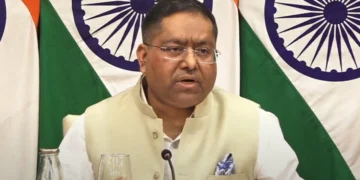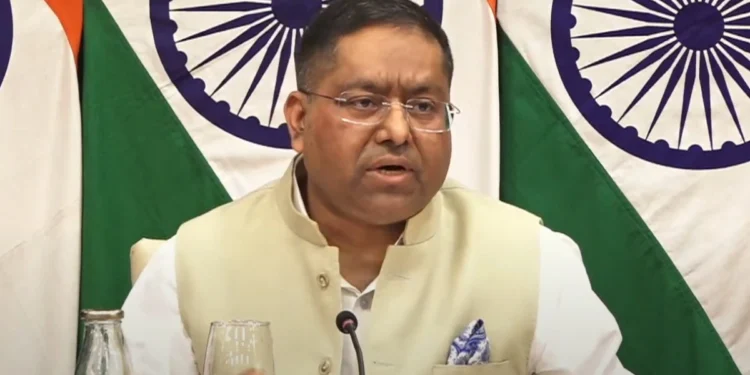Bangladesh on Murshidabad Violence: The Ministry of External Affairs made the statement in response to the comments made by Bangladesh officials on the developments in West Bengal amid protests against the Waqf (Amendment) Act.
West Bengal, particularly the ongoing protests against the Waqf (Amendment) Act, the Ministry of External Affairs (MEA) has issued an official statement addressing comments made by Bangladeshi officials regarding the violence in Murshidabad. The situation has drawn attention, with Bangladesh officials expressing concern over the escalating protests, and the MEA providing clarity on the Indian government’s stance in response to the situation. The statement emphasizes the importance of maintaining diplomatic relations and fostering peaceful resolutions amidst the unrest
India Rejects Bangladesh’s Remarks on Murshidabad Violence, Urges Dhaka to Focus on Protecting Its Minorities
India has firmly rejected comments made by Bangladeshi officials regarding the ongoing violence in West Bengal. The Indian government has urged Bangladesh to focus on safeguarding the rights of its minorities instead of engaging in what it called “virtue signalling.”
Randhir Jaiswal, the official spokesperson for the Ministry of External Affairs (MEA), addressed media queries on Friday, responding to remarks from Bangladeshi officials about the unrest in West Bengal, particularly surrounding protests against the Waqf (Amendment) Act of 2025.
Jaiswal described the comments as a “barely disguised and disingenuous attempt” to draw a parallel with India’s concerns over the persecution of minorities in Bangladesh. He added that, in Bangladesh, the perpetrators of such criminal acts against minorities continue to roam free, further underlining the need for Dhaka to address its own internal issues before commenting on India’s domestic affairs.
This diplomatic exchange highlights the ongoing sensitivity regarding minority rights and inter-country relations, with both nations facing scrutiny over their treatment of religious and ethnic communities.

Murshidabad: Rather than making unnecessary comments or engaging in virtue signaling, Bangladesh should prioritize safeguarding the rights of its own minority communities.
Shafiqul Alam, the press secretary to Bangladesh’s Chief Advisor Muhammad Yunus, issued a strong statement on Thursday, urging both the Indian government and the West Bengal administration to take comprehensive measures to safeguard the rights and well-being of the minority Muslim population.
In his statement, Alam condemned the recent attacks on Muslims that have resulted in both loss of lives and properties. He emphasized the need for immediate action, calling for all necessary steps to ensure the full protection of the Muslim community in India, particularly in West Bengal.
Sectarian violence has erupted in parts of West Bengal, particularly in Murshidabad, in the wake of protests by the Muslim community against the Waqf Amendment Act. These protests have tragically resulted in the loss of three lives and left several others injured. The unrest has raised concerns over the escalating tensions in the region, with authorities working to restore peace and address the issues fueling the protests.
India on Friday strongly rejected remarks made by Bangladeshi officials regarding the violence in West Bengal, urging Dhaka to shift its focus towards safeguarding the rights of its own minorities rather than engaging in “virtue signalling.”
Responding to media queries, External Affairs Ministry spokesperson Randhir Jaiswal stated, “We reject the comments made by the Bangladesh side about the incidents in West Bengal.” He emphasized that these remarks were an attempt to draw a misleading parallel to India’s concerns over the persecution of minorities in Bangladesh, where the criminals behind such acts continue to roam free.
Jaiswal further added, “Instead of making unnecessary statements and indulging in virtue signalling, Bangladesh should prioritize the protection of its own minority communities.”
We strongly urge both the Government of India and the West Bengal administration to take immediate and decisive measures to ensure the safety and protection of the minority Muslim community. This call for action comes in light of the recent unrest in some parts of West Bengal, notably in Murshidabad, where sectarian violence erupted following protests by the Muslim community against the controversial Waqf Amendment Act.
Additionally, the already strained diplomatic relations between India and Bangladesh have further deteriorated. The situation worsened after the flight of former Prime Minister Sheikh Hasina from Dhaka in August of last year, following a massive anti-government protest. The tensions escalated significantly when the interim government led by Yunus struggled to prevent widespread attacks on minorities, particularly Hindus, within Bangladesh.
It is imperative for both governments to address these issues and work towards restoring peace and harmony in the region.
Read Also
CRPF to Play Key Role in Mission to Eradicate Maoism by March 2026: Amit Shah















 Categories
Categories









